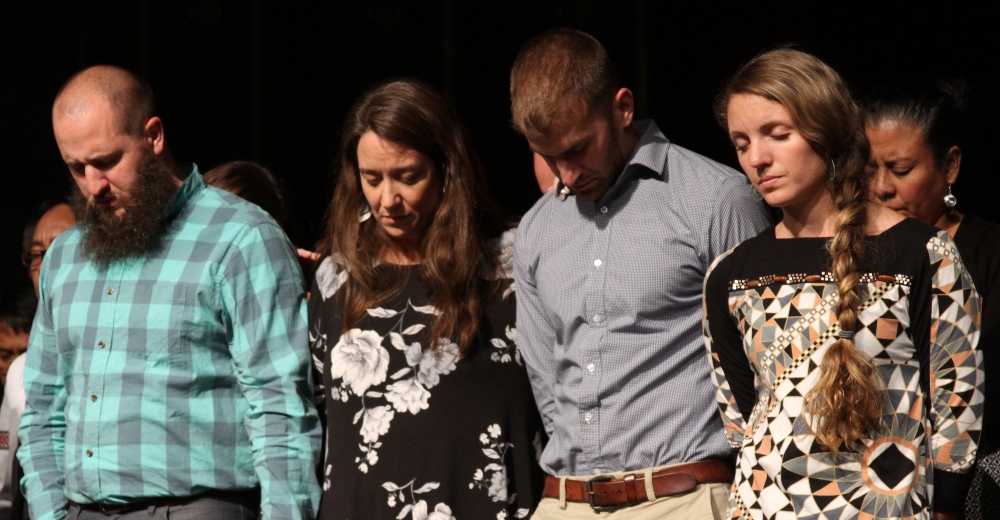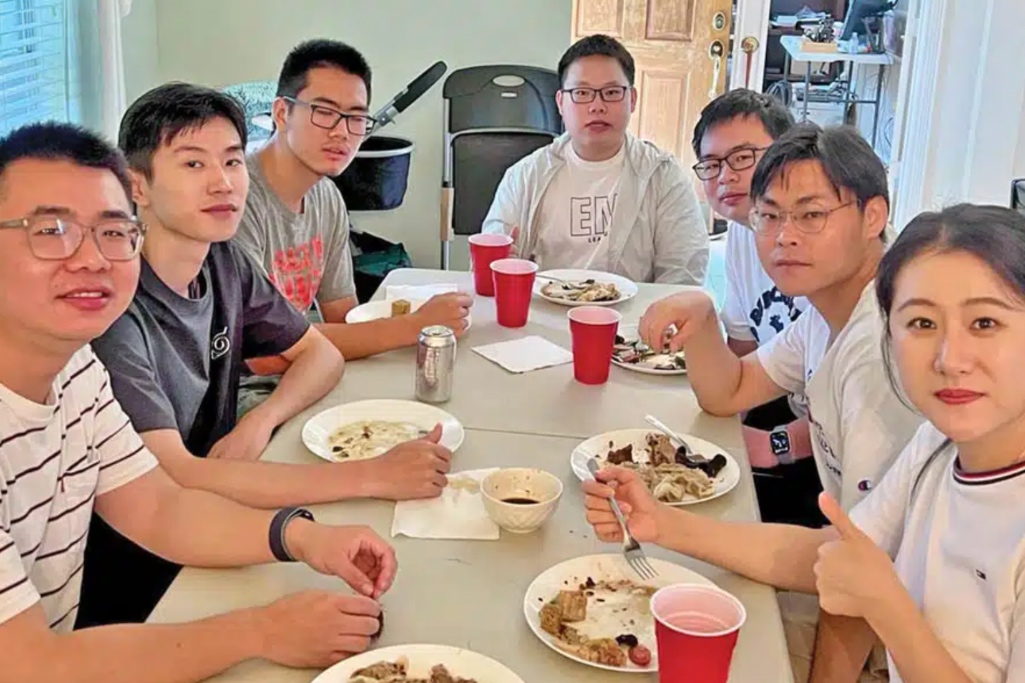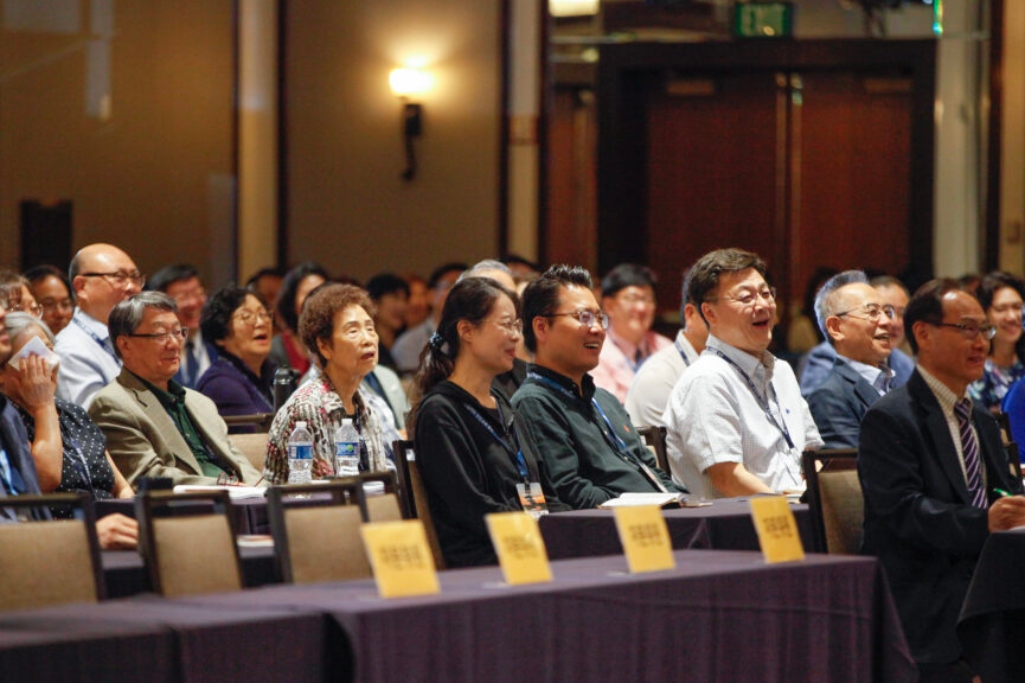
North Carolina’s 5.8 million lost people offers a daunting challenge to the Baptist State Convention of North Carolina (BSC), said Chuck Register, BSC executive leader for church planting and mission partnerships.
“We celebrate God’s amazing grace, birthing hundreds of new churches across our state,” Register said during the Nov. 11 evening church planting celebration service during the BSC annual meeting in Greensboro.
“Through partnerships with churches, local Baptist associations and church planting networks, the Baptist State Convention seeks to facilitate the planting of urban churches, rural churches, English speaking churches and non-English speaking congregations all with the same DNA – churches that seek to impact lostness through disciple making,” he said.
More than 100 church planters and family members took part in the service.
“You’re beautiful,” said Milton A. Hollifield Jr., BSC executive director-treasurer. “We thank God for you.
“As you look at this group of people standing behind me tonight, it is somewhat representative of the way the face of North Carolina has changed over the years.”
BSC board members and officers as well as members of the church planting team were invited to pray with church planters on the stage.
BSC church planting team leader Mike Pittman shared three stories of church planting across the state.
Church merger
Betty Brady’s church, Camp Herman Baptist Church in Browns Summit, was dying. There were only about 15 people regularly attending, and there was only enough money to last a few more months. She had been at the church more than 60 years.
“I couldn’t stand the thought of boarding up those windows, somebody coming and shooting out those stained glass windows,” she said. “We had to do something.
“We chose to take what we had and invest it in God’s Kingdom.”
Proximity Church was sent out by another congregation. They sent Mike Reeve, Proximity pastor, and 15 people to plant a church at a middle school. Every week, members and staff set up the church on Fridays and were able to store their equipment and supplies at the school, but the downside of meeting in a middle school is the smell, he said. During the summer, the county turns off the air conditioning, so services were challenging in the heat.
One morning, while Reeve was having quiet time, he received a call from Camp Herman’s pastor about a possible merger. Reeve called Brady a person of influence that helped “the church along in the merger.”
He called her the “matriarch of the church. We wouldn’t be where we are today without Miss Betty.”
Pittman asked Brady to share some of the changes that had occurred.
“Well, they treat me like a queen,” she said to laughs from the crowd. “Mike is just wonderful. He’s a good pastor.”
She also praised another pastor, but stressed that “we ain’t trying to get rid of either one of ‘em.
“But the thing that bothered me the most, and I still have a problem with it, is this music,” she said. “I’m used to the Broadman Hymnal.”
While it has been an adjustment for Brady, she said, “I’m doing better. I love it, I love the people.”
While they are down to seven original members from Camp Herman, she said, “We’re happy, and we praise God every day that the church is still standing, no busted windows, and we’re open every Sunday.”
Reaching Hispanic families
A year into studying the Book of Luke as a church, members of Flint Groves Baptist Church in Gastonia realized Jesus saw people.
“We prayed for us to see people,” said Pastor Ronnie Bowers. “We realized one of the largest unreached people groups in our areas were Hispanic families.”
So, they worked with Jose Hernandez to plant a church four years ago with a block party.
Hernandez thanked Bowers for the resources and support.
“Our church used to look just like us,” said Bowers, who is white. “Our people are now coming up and saying there are other nationalities besides us and Hispanic families. We ought to do something else with that. It’s opened us up to a new stewardship, that all the things that God has blessed us with were not just for us.”
Hernandez hopes to build on its efforts in community relations and developing church leaders to grow its ministry.
For Bowers, this move has shown that “God can take all the things that we have, and we can use them in a better way, a more effective way for the Kingdom.”
Churches planting churches
In 2010, Chris Hankins started The Point Church in a movie theater across from North Carolina State University. Within 18 months, The Point’s Apex campus started meeting.
In 2011, Donnie Paschall helped start Vertical Church in Lumberton, which also began in a movie theater. Within 24 months, Vertical launched a second campus.
These two churches have planted other sites as well.
“Both of these churches, when they came together, it was a like-minded work that happened,” said Pittman, who, prior to his work at the convention, was a pastor at Vertical Church. It was part of the church’s vision to reproduce or plant other churches.
“We can do more together than we can apart.”
With Point and Vertical partnering together, Journey Church in Havelock began in February 2017. David Mills pastors the Havelock plant.
The Point and Vertical provided money and people.
“We had no clue what we were doing,” said Mills. “These two churches gathered around us and taught us what it was to be church planters.”
Vertical, Journey and LifeSpring Church partnered to help Billy Roy start Crossroads Church in Whiteville in December 2017.
“They helped us get off the ground,” Roy said.
Almost two months later, Roy said Crossroads was already planning to plant another church.
So, Vertical, The Point, Journey and Crossroads helped start Sojourner Church in Concord in February 2019 with Pastor Corey Alley.
Alley said the church plans to plant churches in the Cabarrus/Concord region.
Quintell Hill was a church planting apprentice serving as part of the original Sojourner team that started planning in October 2018.
Hill launched Multiply Community Church in Monroe in September.
Sojourner and Multiply plan Grace City Church in Charlotte for September 2020 with Daniel Smith leading. Smith is currently in a residency program with the two churches.
“And God is in the midst of all of it,” Pittman said. “These are normative size churches. This is something all of our churches can do.”
For more about how your church can get involved in planting churches, contact (800) 395-5102, ext. 5548, or email [email protected].


